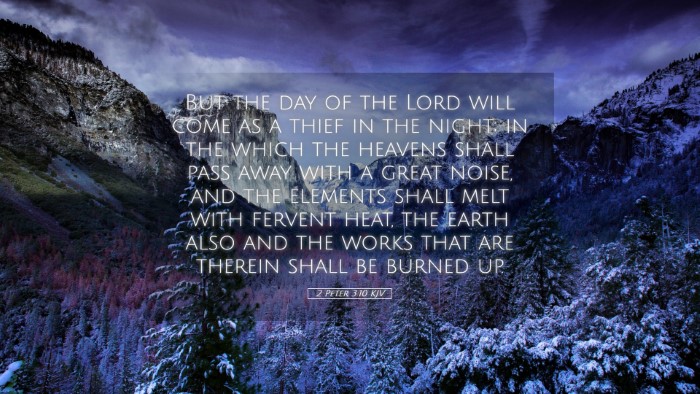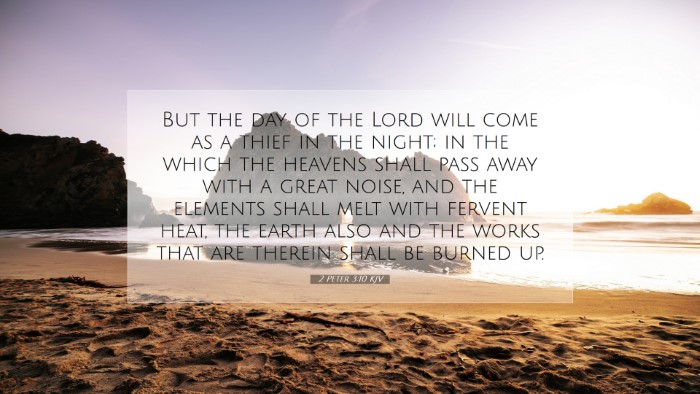Old Testament
Genesis Exodus Leviticus Numbers Deuteronomy Joshua Judges Ruth 1 Samuel 2 Samuel 1 Kings 2 Kings 1 Chronicles 2 Chronicles Ezra Nehemiah Esther Job Psalms Proverbs Ecclesiastes Song of Solomon Isaiah Jeremiah Lamentations Ezekiel Daniel Hosea Joel Amos Obadiah Jonah Micah Nahum Habakkuk Zephaniah Haggai Zechariah Malachi2 Peter 3:10
2 Peter 3:10 KJV
But the day of the Lord will come as a thief in the night; in the which the heavens shall pass away with a great noise, and the elements shall melt with fervent heat, the earth also and the works that are therein shall be burned up.
2 Peter 3:10 Bible Commentary
Commentary on 2 Peter 3:10
Verse Text: "But the day of the Lord will come as a thief in the night; in which the heavens shall pass away with a great noise, and the elements shall melt with fervent heat; the earth also and the works that are therein shall be burned up."
Introduction
This verse from 2 Peter 3:10 plays a significant role in understanding eschatological themes within the New Testament. It speaks to the certainty of the return of Christ and the eventual transformation of creation. Various public domain commentators illuminate aspects of this verse that are vital for pastors, students, theologians, and Bible scholars.
Contextual Analysis
Matthew Henry: Henry emphasizes that the context of this verse is crucial for understanding the nature of God's judgment and the return of Christ. Previously in the chapter, Peter addresses the scoffers who question the promise of Christ's return, reminding the believers that God's promises are steadfast and timely, even when delayed. He asserts that the “day of the Lord” signifies a definitive intervention by God in human history.
Albert Barnes: Barnes highlights that the phrase "as a thief in the night" illustrates the unexpectedness of the Lord’s return. He cites that it will come suddenly and without warning, emphasizing the need for vigilance among believers. The thief metaphor suggests not only surprise but also the urgency of being prepared for that day.
Adam Clarke: Clarke elaborates on the cosmic consequences of this day, noting that the “heavens shall pass away” implies a complete transformation of the universe. He indicates that this destruction is not merely punitive but also redemptive, leading to a new creation devoid of sin and evil.
Interpretive Themes
- The Day of the Lord:
This phrase indicates a time when God will execute judgment and fulfill His promises. It is a significant motif in both the Old and New Testaments, indicating divine authority and the culmination of human history.
- Unexpected Return:
As the verse likens Christ's return to a thief in the night, it serves as a stark reminder to believers of the unpredictability of God's timing, urging constant readiness and moral vigilance.
- Cosmic Transformation:
This transformation includes the “elements” melting with fervent heat, symbolizing God’s power over creation and the eventual renewal of all things. This serves as an encouragement for believers to long for a new heaven and new earth.
- Judgment and Renewal:
The passage foreshadows not just judgment but also subsequent renewal, assuring the faithful that the end is not merely destruction but transition into a perfected state.
Application for Believers
Preparation for the Return: The suddenness of Christ’s second coming calls for a life of continual readiness. Believers are encouraged to evaluate their lives in light of eternity, living according to the tenets of faith and righteousness.
Hope in Judgment: While the day of the Lord signifies judgment, it also carries hope for restoration. The faithful are reminded that earthly struggles and suffering will ultimately lead to a glorious inheritance in a new creation, free from sin.
Christian Witness: The certainty of the coming day of the Lord urges Christians to share the gospel boldly, as the imminent return of Christ brings urgency to the mission of the Church.
Theological Reflections
This verse invites deeper theological reflections on the nature of God as sovereign judge and redeemer. The intersection of judgment and mercy is profound, exemplifying God’s justice in executing judgment while simultaneously offering grace for salvation.
Matthew Henry: In his commentary, Henry reminds us that God's judgment serves to vindicate His righteousness, while His mercy offers a path for repentance and salvation. Wisdom lies in recognizing our position in light of divine sovereignty.
Albert Barnes: Barnes’ reflection on the urgency of preparation deepens the theological conversation about human responsibility in light of divine action—believers must strive toward holiness as they anticipate the consummation of God’s promises.
Adam Clarke: Clarke speaks to the implications of a future hope, underscoring the transformative power of God's presence in both judgment and renewal, illustrating the ultimate purpose of creation itself.
Conclusion
The verse 2 Peter 3:10 is a powerful reminder of the certainty and abruptness of the Lord’s return. As believers, the call is to live in anticipation of that day—prepared, hopeful, and steadfast in the faith. The insights from Matthew Henry, Albert Barnes, and Adam Clarke, alongside the theological implications of this passage, provide substantial contours for understanding the significance of the end times in the believer’s life and the broader narrative of redemption.


